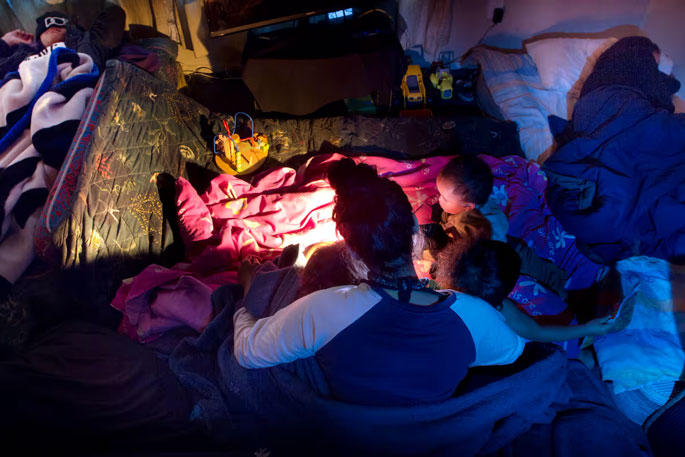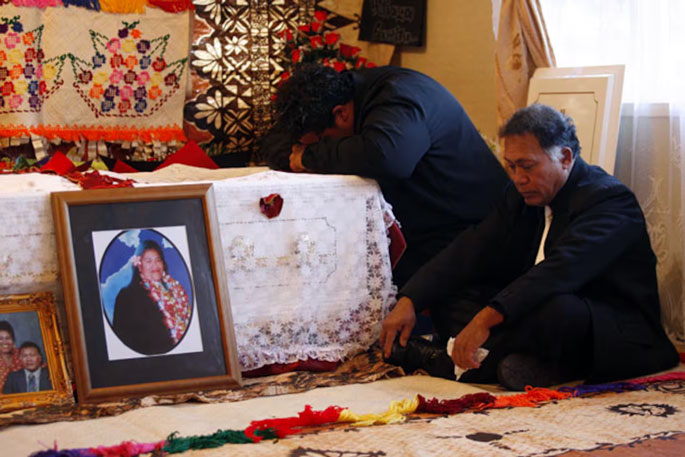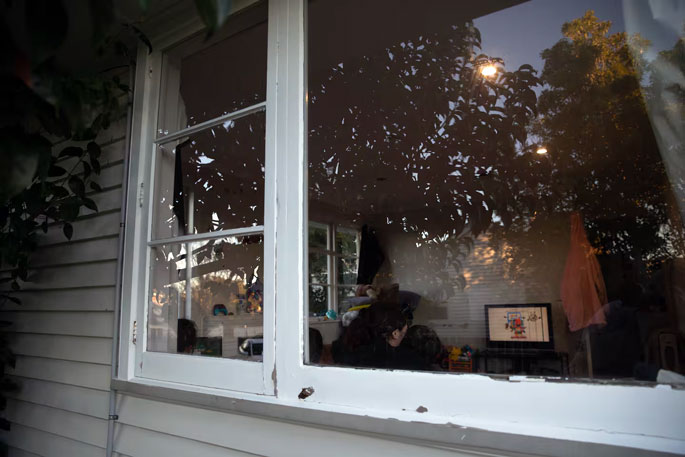Each year around 40,000 New Zealanders are disconnected from the power supply for non-payment, according to Consumer NZ. They are surviving winter in cold, dark homes without access to a warm shower or a homecooked meal – some for months.
Meanwhile, the main players in the power business are making huge profits – including charging hundreds for reconnections, often done by the touch of a button. In the first part of a series about power, we speak to those going without.
At least twice a week, the pre-paid power meter in Maddy Walker’s Hamilton home glows red and the scramble is on to scrape together money to top up.
Sometimes a $20 loan from Maddy’s sister gets them through – other weeks, the power is disconnected and the family of four are on the cold and soul-destroying countdown until payday.
“We’ve had times recently where we’ve gone to the pools for a shower, we have a chilly bin for food and I cook on the BBQ,” says Maddy, not her real name.
“Even when I have topped up, we try to go without the heater because it drains the meter so quickly.”
Maddy signed up to Mercury Energy’s Glo-bug pre-paid system when she was disconnected from her usual supplier after getting behind on payments and racking up a $700 bill a few years ago.
“I had so many bills coming in and I couldn’t keep up. I got notices they were going to disconnect me but I couldn’t afford it I thought they would let me pay it off,” she says.
“When it was disconnected I was so embarrassed. One of my boys had friends over and there was no power. I was ashamed and pretended there was a power cut.”
On that occasion, Maddy went without power for four days until she borrowed money to pay the bill.
“They charged us for disconnection and then it was a couple of hundred or something to get reconnected,” she said.
“I already couldn’t afford the bill and then I had to pay my sister back and pay extra for the reconnection.”
Months later, she faces disconnection again.
“That time we had no power for about two weeks and it was terrible. The house was freezing and we had no hot water or anything.
“I was so ashamed and sad for my children.”
Food or heating
Solo mum Jenna often has to choose between food or heating.
Last week, she had no choice but to ask for a food parcel from BBM Foodbank, run by community advocate Dave Letele, after threats of disconnection.
“The house I rent has wood floors so I have to use the heater to keep my children warm this winter otherwise it’s freezing,” says Jenna.
The mum of three occasionally sleeps in the lounge with her children to save heating the whole house.
She has also asked the property manager if the home is properly insulated and if a heat pump would be more efficient.
“I have asked but I also don’t want to be seen as complaining because I need this home for my children, I don’t want to be homeless.”
Jenna says she has been disconnected previously and had to pay hundreds to get reconnected.
“I can’t afford for that to happen again so I have had to choose paying the bill over buying food.”
Four months without power
Maddy and Jenna’s experiences with energy hardship are not uncommon according to those who run New Zealand’s City Missions.
In the last two weeks alone, more than six desperate households have called the Auckland City Mission asking for food and assistance, solely because of a high power bill.
Ellen Lear from the Mission says this includes a solo mum who had not eaten for three days because her whole benefit of $382 went on a power bill to avoid disconnection.
Carla Ceppi from Wellington City Mission has assisted a family with two children who had lived without electricity for four months.
“They had cold showers every now and again and the children ate meals at school and just had snacks at home.”
“The family were very ashamed; they took four months to come to us,” says Carla.
Carla says it's unacceptable for families to go without an essential service when power companies profit through disconnection and reconnection charges.
“We don’t think it’s fair that people who already can’t afford the actual bill have to pay for disconnection, arrears, and the $200 on top for reconnection.”
So what is energy hardship?
The Ministry of Business, Innovation, and Employment defines energy hardship as households who have either struggled to pay energy bills in the past year, not heated their home adequately, put up with feeling cold to keep costs down and lived with dampness.
Dr Kimberley O’Sullivan from Otago University adds energy hardship is “tricky to measure” and says as well as not being able to maintain their homes at a healthy temperature, there are also those going into debt or rationing other necessities.
For those living it, it could be taking the family to the local pools for a shower because there’s no hot water, eating a cold meal by torch or candlelight, cooking outside on the BBQ or skipping meals to pay the power bill.
Whatever the measure it’s clear people are making dangerous and heartbreaking choices in the coldest months to keep the power or to get reconnected.
Big profits versus poverty
This comes as Consumer NZ reports the financial records of the ‘big four’ power companies - Meridian, Contact, Genesis and Mercury – had combined earnings of $2.7 billion over the last year – about $7.4 million a day.
In 2023 that meant a combined net profit after tax of $520m.
Over the same period, an estimated 40,000 Kiwi households had their power disconnected for non-payment according to Consumer NZ research.
Disconnection means a bad credit score, so the only option for those cut off often is the more expensive prepaid power.
According to Paul Fuge at Consumer NZ prepay customers are paying around 13 per cent more despite being less able to afford it.
 Kiwi children are going to bed cold with an estimated 50 households a night are going without power according to Consumer NZ.
Kiwi children are going to bed cold with an estimated 50 households a night are going without power according to Consumer NZ.
Recent research by the consumer watchdog also reveales around 18 per cent of people have experienced financial difficulty paying their bills and 13 per cent have to borrow from family and friends to pay a bill.
Around 11 per cent of people say their home is not warm enough because they can’t afford the extra money to heat their home.
As an essential service, Consumer NZ says the electricity connection should never be removed because of non-payment.
“Ongoing access to safe, reliable, and affordable electricity is fundamental to our health and wellbeing, and our ability to function in a modern society,” says Paul.
Heartbreaking choices
Advocates for those struggling tell of solo mums only using power when their children are home, families turning the hot water cylinder off for days, using a BBQ to cook dinner and not heating the home.
Disconnection and reconnection fees of around $27 to $300 are an added hit for already financially stressed families.
Some say they have no choice but to stay disconnected.
Those on pre-pay systems such as Glo-Bug tell of the anxiety that comes when the “device glows amber or red” and they know disconnection is imminent unless they top up.
Some go for days, weeks and even months without power because they don’t have $10 to make the minimum payment.
Energy hardship expert Kimberly O’Sullivan from the University of Otago has made it her life’s work to research and find solutions for those struggling to keep the lights on.
 Families often sleep together for warmth in one room to avoid heating the whole house. Photo / Stephen Parker.
Families often sleep together for warmth in one room to avoid heating the whole house. Photo / Stephen Parker.
Kimberly has been into “freezing and unheated homes” to speak with people living without power.
She tells of families who have lived without power for months.
No heating, no hot showers, no light at the touch of a switch. Just cold, unhappy hardship.
“That was one of the more severe cases but there are others out there that we don’t hear about,” she says.
“One family had been disconnected and then went without power for four months because they were unable to reconnect.”
Kimberly says it's unacceptable that thousands of New Zealand households are living without the basic right of power.
She has walked up paths “with frost on the grass” and sat in “freezing unheated homes” to hear heartbreaking stories from people who were struggling to keep the lights on.
Some will go without other essentials to “keep the light on” because of the shame they feel when the power is cut.
“They don’t want the neighbours to notice the power has been off for days on end so they go without to pay the power bill.”
“There are parents who will skip a meal and families who will turn off the hot water cylinder for days so they can afford the bill.”
Kimberly says it's unacceptable that families are living without power but even more heartbreaking is those dying without it.
Living and dying without power
In 2007, Māngere woman Folole Muliaga died hours after a Mercury Energy contractor cut the power to the home because of an unpaid bill.
Folole was using an oxygen machine and the coroner ruled the lack of electricity contributed to her death.
“For me that kicked things off, because after that I was speaking to kaumātua and they were using oxygen machines and they were really worried,” says Kimberly.
 Family members grieve at the casket of Folole Muliaga, who died after electricity was cut off to their home because the bill was not paid. Photo / Glenn Jeffrey.
Family members grieve at the casket of Folole Muliaga, who died after electricity was cut off to their home because the bill was not paid. Photo / Glenn Jeffrey.
Despite policy changes that came about after Folole’s death, Kimberly says there are numerous deaths where power poverty is a hidden factor.
“We don’t see it reported but if you look carefully there are people who are dying because of the way they are heating their house or what they are doing to cope without power.”
This includes deaths resulting from patio heaters used inside, candles used for light and children dying from illnesses caused by living in a damp and cold home.
Too many are going cold
Data from the 2023 Energy Hardship Expert Panel’s final report revealed 110,000 households can't afford to keep their home adequately warm.
But that figure is grossly underestimated according to others working in the field.
Kimberly, the energy hardship expert from the University of Otago, says that figure is drawn from people who say they can't heat their home “a lot” of the time.
“Based on current research we are undertaking we’re finding between 16-30% of homes are affected, depending on the measure used,” she says.
“This is much higher than the most recent report by MBIE finding that 110,000 households or 5.8 per cent of homes are unable to keep warm.”
The report also revealed in 2017 alone living in a damp or mouldy house in New Zealand led to 6276 hospitalisations and represented a cost of $36m.
Prominent lawyer Olinda Woodroffe, who represented the Muliaga family, says it's a sad indictment that 17 years after Folole Muliaga’s death, there are still average New Zealand households rationing or living without power.
“We have a duty to ensure all people in the community have access to power, particularly those who are elderly, unwell and families,” says Olinda.
“We know it’s good for businesses to make a profit but with essential services such as electricity, the focus should be wellbeing people’s health needs to be protected irrespective of their income.”
“It is a human right.”



5 comments
Clues
Posted on 08-07-2024 12:30 | By SonnyJim
The first sincerity thing I'd look at is the vege garden size, the Sky dish, and a tidy lawn. Vege grow well in sunny 'flower' plots against the house and tomatoes have to be the easiest plants to grow - a dozen managed Roma plants can produce 1000 free tomatoes. And etc. etc.
A litany of non-caring.
Posted on 08-07-2024 13:01 | By morepork
The whole process of power distribution in this country has been marked by a callous disregard for consumers and a failure to invest in a more robust network. I have posted here on numerous occasions when we see hundreds of homes left without power because some drunken idiot hit a pole with a car. It's beause there has been complete failure to invest in the reticulation and provide communities with alternate and redundant access, as is normal practice overseas. There should not be ONE main power line feeding a community of thousands of people. Reading this article just confirms that electricity supply needs more careful overview and control, with power companies curbed in their profiteering, and with specifc criteria before supply CAN be discontinued. Households in hardship (especially with kids or elderly), should be given special rates and pricing plans. We need to care for our people.
Consumer
Posted on 08-07-2024 14:11 | By Paul W2
It's funny how Consumer NZ goes after the supermarkets with vigor but says nothing about the power companies. Maybe because they have a finger in the power supply system with their Power Switch site.
@Morepork
Posted on 09-07-2024 09:14 | By SonnyJim
Powerlines are extremely expensive to build, and the present system is quite robust. A recent news article describes localities such as in the Coromandel's receiving large power generator installations in leu of powerlines to provide a standby emergency power supply. If the writer has any evidence whatsoever of power company profiteering or malpractice, then the Commerce Commission should be told immediately. With regard to 'not cutting off the power', early experience taught power suppliers around the world that the soft approach NEVER works - hence the practice of pay-as-you-go options for power and gas - a very common worldwide energy management option for domestic users. As NZ's and the world's population keeps growing electric power costs grow exponentially so it's a case of suck-on-it or stop multiplying, or if you prefer - breeding.
@Sonnyjim
Posted on 10-07-2024 13:30 | By morepork
I enjoyed your response, thanks. Having worked inside several major Power companies in Europe (8,000,000 subscribers, in the largest one), I would strongly contest your statement that "early experience taught power suppliers around the world that the soft approach NEVER works". In fact, suppliers who take a more responsible approach and work WITH communities, actually end up more profitable.
You say our network is robust; ask the people without power when a pole is hit.
Pay-as-you-go evolved out of the old "shilling in the meter" in the U.K. but the modern implementation is much broader (and, arguably, fairer and more responsive...).
There is NO reason why per capita costs should grow as population increases; in fact, you would expect economies of scale to apply.
The sad fact is that we are being ripped off when it comes to electricity, and we have little redress.
Leave a Comment
You must be logged in to make a comment.